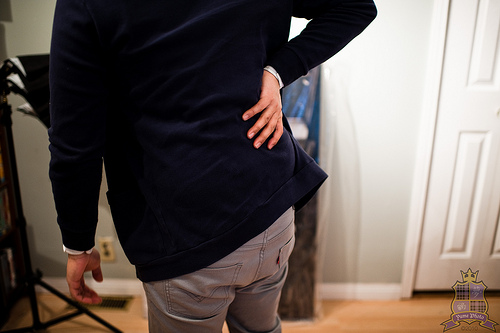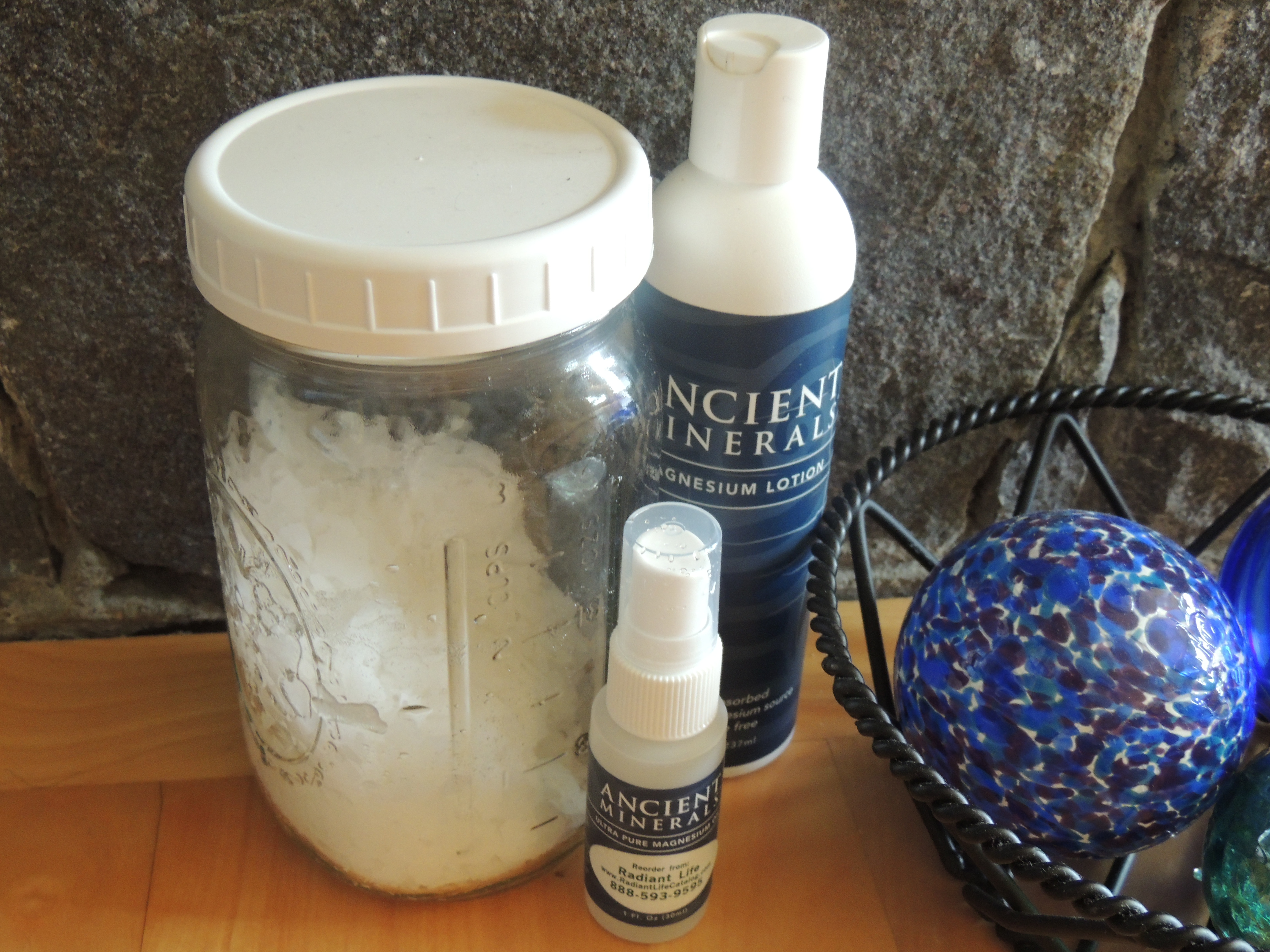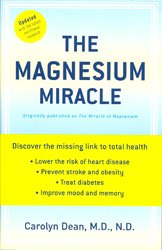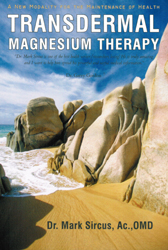Muscle aches, cramps and spasms are just plain old annoying. A simple twinge in the back or a tight calf muscle can render you frustratingly out of commission, and it often seems that no concoction of lotions nor complex stretch regimens can bring lasting relief. Studies have shown that there is absolutely no proof that popular over-the-counter medicated muscle rubs are at all effective in the treatment of irritated muscles. As short term fixes to underlying inflammatory issues, most medicated "soothing lotions" and elaborate "pain-relieving" balms are far more harmful than they are any good. Many commercial muscle rubs contain potent analgesic drugs, which are quickly (and dangerously) absorbed into the blood stream when applied to the skin. Turns out there is an inexpensive natural remedy that big industry doesn't talk about, a remedy that gets to the core of the issue and not just the bothersome symptoms. This remedy is transdermal magnesium.

Understanding the Magnesium-Muscle Link
The essential mineral magnesium is extremely important for normal biological function, affecting nearly all aspects of cell production and growth. Often referred to as "the spark of life," adequate magnesium stores are absolutely critical when it comes to all neuromuscular interactions. When considering magnesium’s role for healthy muscles it is important to understand three points:
-
Magnesium supports the production and transportation of energy: Magnesium, along with the B-complex vitamins, are often referred to as “energy nutrients.” They activate the enzymes in the body that control the absorption and utilization of proteins, carbohydrates and fats. Notably, magnesium-dependent enzymes are involved in the creation of adenosine triphosphate (ATP), the primary energy storage molecule in the body. This molecule is required for all life functions. Thus without magnesium there is no energy, no thought and not even a possibility for muscles to move.
-
Magnesium helps with the proper transmission of nerve signals: Our muscles function largely on a system of electrical transmission: impulses travel along nerves to and from the brain to stimulate movement. These electrical microcurrents are conducted up and down the nerves by molecules of calcium. Magnesium is responsible for regulating this transmission process and is actually found at concentrations 10,000 times greater than calcium within the cells. Magnesium lets just enough activating calcium into cells to allow for an electrical signal to be sent, and then quickly pushes it back out again. Without adequate magnesium to oversee the conduction process, the nerves become flooded with excess calcium and are hyper-excitable. Muscle spasms occur as the nervous system attempts to release this tension by firing signals at random groups of small muscles.
-
Magnesium aids in muscle relaxation: Calcium initiates contraction in skeletal muscle fibers and magnesium creates relaxation. If there is too much calcium build-up in the muscles and insufficient magnesium, lactic acid will build up with movement and there will likely be a painful sustained contraction. This is what we experience as pesky, debilitating cramps. In the smooth muscles of organs, unbalanced magnesium levels cause tightening of the bronchial tract (resulting in asthma symptoms), uterine cramping (bringing on painful periods) and blood vessels spasms (causing hypertension).
Step 1: Correcting Magnesium Deficiency
So does this mean that all cramps and aches are caused by just magnesium deficiency? Certainly not. The body is far too complex to make such sweeping generalizations. Other mineral imbalances such as potassium deficiency (although more often associated with muscle weakness) and mechanical stressors can also play a part in disrupting muscle function. However, magnesium is definitely a contributing factor. Renowned magnesium researcher and clinician Carolyn Dean, M.D, N.D believes that "muscle spasms are a sure sign of magnesium deficiency." This incredible muscle-relaxing mineral can also be helpful in recovery from strains, sprains and other non-deficiency related injuries as well.

Dean explains that supplementing with daily magnesium is a key first step in treating muscle spasms and cramping, and also in improving overall muscle performance. Dubbed the "missing mineral," experts estimate that nearly 200 million people in American alone suffer from a significant magnesium deficiency and the wide range of conditions it contributes to. Magnesium is quickly lost through sweating, exertion, and stress. There are many contributing reasons for the widespread magnesium deficiency in this day and age. Studies have shown however, that when magnesium levels are at harmony in the body, bothersome deficiency symptoms such as muscle cramping, fatigue, headaches and anxiety are dramatically improved.
Because oral magnesium is irritating to the GI system and only 35-40% effective, experts often recommend using concentrated magnesium oils on the skin as the most effective method of supplementation. Transdermal magnesium therapy has been shown to be a highly valuable method for replenishing cellular magnesium stores in a way that is gentle, rapid and safe. The body absorbs just the amount of magnesium it needs through the skin, preventing excess supplementation and GI upset. Ancient Minerals magnesium is the gold standard in purity, offering an all-natural form of raw magnesium chloride and other trace minerals drawn from the Ancient Zechstein Seabed in Northern Europe. Transdermal magnesium is available as a lotion, gel, spray or in bath flakes - all of which are easy to incorporate and surprisingly enjoyable to use. Although history, diet, stress, physical exertion and other lifestyle factors all play a role in determining the amount of magnesium required by an individual at any given time, a general rule of thumb for daily supplementation is 3-4 mg of magnesium per pound of body weight.
Step 2: Muscle Soothing Techniques
For additional muscle cramp relief as you are building your magnesium stores, try massaging some magnesium lotion directly onto the irritated muscle; 1 tsp of lotion delivers 185 mg of quality elemental magnesium in a base of nourishing coconut oil. A little of this velvety lotion goes a long way and it feels wonderfully smooth on the skin. The magnesium spray and gel work in an equally effective manner and can be selected depending on application preference. For optimal uptake of magnesium ions, it is best to apply to clean skin. If you notice any salt-like residue remaining on your skin after 20 minutes, you can rinse it gently with warm water.
For particularly stubborn muscle and joint aches a warm, healing bath or foot soak using magnesium bath flakes can work wonders. Dissolve 1-3 cups of magnesium to a warm bath and soak in it for at least 30 minutes. Each cup of flakes contains 15 grams of magnesium. It is important that the temperature of the water is warm, not hot as excess heat causes the skin to eliminate rather than absorb. Rinse skin with warm water before drying off.
Photo: Back Pain by kurichan+ /Courtesy Flickr
Find this post and others at Kelly the Kitchen Kop's Real Food Wednesday
*All articles and information on this website are for educational purposes only. They are not to be regarded or relied upon as medical advice. These statements have not been evaluated by the Food and Drug Administration. This product is not intended to diagnose, cure, treat or prevent any disease. Results may vary per person. Consult your health practitioner if you have health problems.


